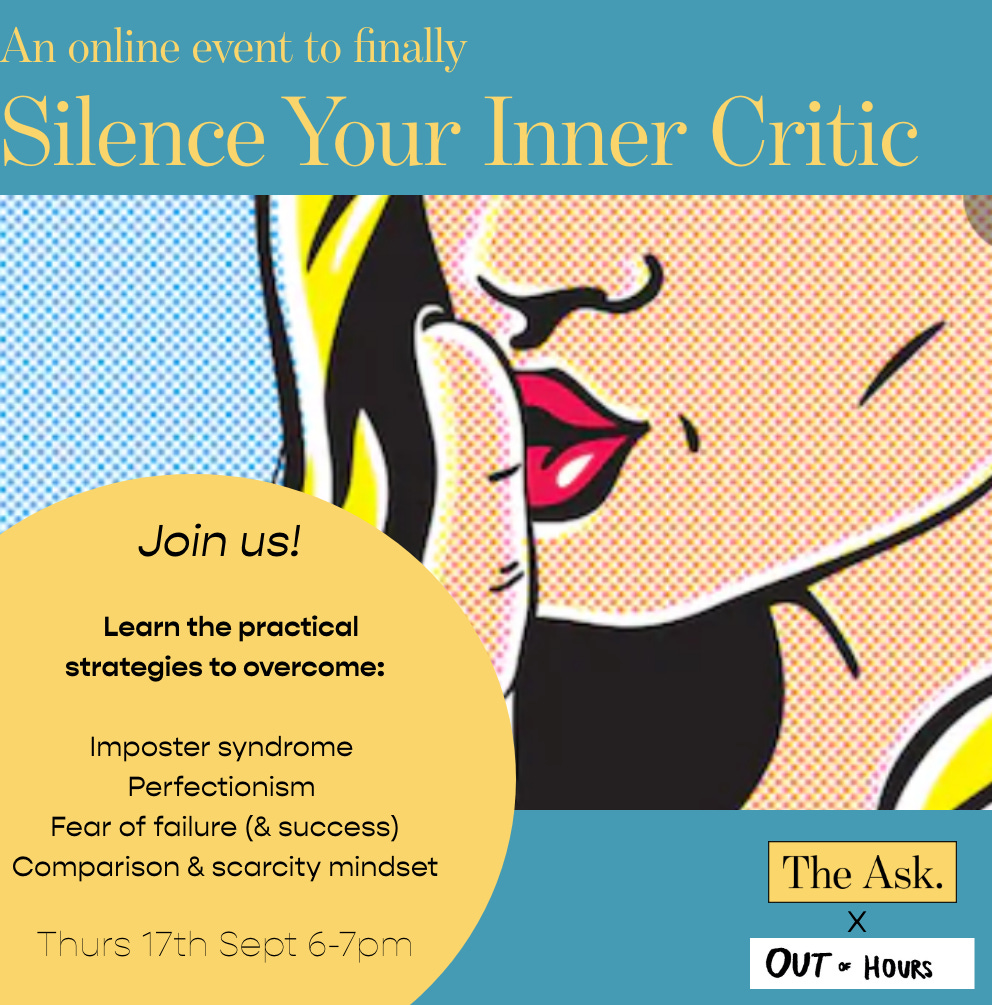What are the most effective online networking strategies?
Tips on establishing your goals for networking, forging new connections and finding value in the online world.
Good Morning,
If it’s your first time reading this then a big hello — here’s what you can expect each Wednesday:
In-depth answers to commonly asked career questions from me, Ellen, Founder & Chief Coach @ The Ask - providing coaching and content for people pursuing courageous career paths.
Let’s get into today’s question:
What are the most effective online networking strategies?
The world has changed and no longer are we having serendipitous interactions in coffee shops, co-working spaces and events in the ways we once had. Whilst offline meetings could well be back in full force soon, they could just as well be taken away again. So we’re left with two options: stop networking or network online.
I owe proactive networking tactics to my own triumphs changing career paths, going freelance, landing corporate clients, and successfully turning my side hustle into my full-time career. When I’ve interviewed for jobs in the past almost 80% of these interviews have been through contacts who knew about openings never listed online. So I’d go for option two if I was you.
P.S. many of these tips transfer to the offline context as well!
Have a WHY
Before you embark on your networking strategy, know your why. If you don’t know where you’re going you might not get there. So what are your intentions?
To start a project and get inspiration or advice? To change careers? To gain more visibility for your business? To find like-minded people in your field?
With a why in mind you can be more targeted and judge the success of your strategy.
Which leads me to…
Set goals
Once you know your why, what would good look like?
E.g a number of new contacts, or a specific outcome you hope to get from these contacts.
My goals around networking include # of new connections weekly in order to build brand awareness, to forge friendships with like-minded founders & freelancers and identify business mentors with more experience to learn from.
It’s ok to have more than one goal, but do make them.
Join communities & be active
The internet is a big bad place and it helps to find a home you can feel safe in, get to truly know people and both give and get value. As well as being active on some of the bigger professional networks, choose a couple of communities that you can spend more time in intimate 1-1 or group conversations based. Choose based on an interest or identity you have.
See below for some suggestions.
Stand for something
In both your online profile as well as through your interactions themselves, be clear on what your ‘thing’ is. Select a few interests that you are focused on and therefore conversations you’d like to have.
E.g. getting into tech, creating social impact, or diversity and inclusion, mastering your subject matter or discipline.
Whatever your ‘things’ are, leave some hints on your profile about what you care about and then use this as a conversation opener with people who share common goals or interests. Mine include coaching, building businesses and startup talent consulting.
Quality over quantity
Big networks are great but only if they are meaningful. So start small and work on maintaining conversations with a smaller group of people first and scaling later on. Seek quality connections where you can genuinely get to know people (rather than bulk connections with no tangible benefits).
Make it personalised
Tell them why you’re connecting but please please please do not say ‘to pick your brain’.
Did you read something of theirs you liked? Did you work at the same place or attend the same event? Are you interested in learning more about their company?
There is no ‘wrong’ reason to want to connect with someone but there is such thing as an overly-generic intro message that can turn people off.
Here’s some LinkedIn connection requests I’m hesitant to accept in my inbox. Whilst they are polite, from their profiles I see no synergy, and they haven’t been specific about their reason for connecting.
Whilst writing something is better than writing nothing, always be specific when you add someone. Otherwise it comes across as spammy; as though you’re adding numbers to your network for the sake of numbers.
Have a clear CTA
A CTA (Call to action) in marketing would be ‘Comment below’ or ‘Buy Now’. So save your new contact the energy of having to figure out what your CTA is by telling them what your aim is here.
A phone call? A zoom? Adding them to your group?
Be clearer and save them the mental capacity, but keep your request reasonable. Email exchanges are an underrated form of value exchange and may provide a good entry point for new contacts.
Give value upfront
How can you show this person you aren’t here to waste their time and this will be a good meeting for them? Give some form of value.
Examples of value could be:
A compliment or piece of feedback about their work, eg their blog post, portfolio or thought piece
An offer to introduce them to someone in your network (only do this if you know this would be useful or can make a specific suggestion)
Offer to sign up to something they are doing e.g newsletter, feedback survey, event
Link to something you think they would find interesting
KISS
No kissing online (tricky to do so, anyway) but Keep It Simple Stupid, a design principle coined by the lead engineer of an early spy plane. The idea being if you can’t understand something you cannot use it properly. In this context, make it easy for someone to understand both what you’re about and what you want from them. Less is more.
Don’t take it personally
Not everyone will respond or take up your offer to speak — and that’s ok. People are busy and sometimes you might have caught them on an off-day.
They don’t know you personally so it literally cannot be personal. For every 10 contact attempts you make, even if one turns out to be useful it should outweigh the nine no- replies. You’re much more likely a 50/50 hit rate (or higher) though, especially if you’ve followed the above steps.
Review, rinse & repeat
Networking is not something you do once and are done. It takes years to build up a great network and often multiple points of connection with someone to create strong foundations of trust and reciprocity. Keep track of who you’ve spoken to and when it makes sense to check in again, you may wish to adopt a contact management tool such as a free CRM. This book by Keith Ferrazzi has some great strategies for maintaining connections, I’ve recommend it to somw coaching clients who said it was a game-changer for them.
I use Hubspot in my business but Google sheets, Notion or most digital note-taking tools could work just as well.
Networking Platforms & Communities
Allow me to introduce you to some communities and platforms to find your people.
By no means is this list exhaustive, but does represent the kinds of places I know readers of this newsletter will enjoy.
i)The big channels
From these pick one to really invest in from a networking perspective, rather than half-efforts across them all. Or split them for your personal and professional life.
LinkedIn - The one-stop professional networking site isn’t going away any time soon. Worth investing energy into your profile and building up connections here from a personal brand perspective for almost any industry.
Twitter - Great for following specific topics and interest groups, think of this as joining a conversation
Instagram - Sliding into someone’s DMs isn’t just for your dating life but many fruitful connections can be made on IG for professionals too especially creatives or business owners.
Connect with me on Linkedin, Twitter & Instagram.
iii) Niche(r) groups
The Dots - Dubbed LinkedIn for ‘people who don’t wear suits’
Elpha - A safe place for womxn in tech around the world
Femstreet - The place for women in VC newsletter, plus a paid community option
Torre - Professional networking to find jobs & freelance gigs
Ness Labs - Online community for ‘makers’ or anyone interested in neuroscience, productivity, and entrepreneurship led by the prolific Anne-Laure Le Cunff whose articles you need to check out regardless
Hi Right now - Discover ambitious and growth-minded people via a series of quick 1 on 1 video conversations similar — speed networking
Lunchclub AI - Curated 1-1 video calls with members. Here is my invite link if you want to sign up you need to be invited (you’re welcome :))
Indie Hackers - Community for people building online projects
FreeTrain - Community for freelancers
Sounding Board - Led by the personal development author & consultant Darius Foroux this is a private community for people who love to learn and create
Out of Hours - the community for people with side projects
That’s it for today. As always do hit reply if you’d like to discuss anything further my inbox is open :)
Do you know anyone you think would benefit from reading this week’s edition? Give them some love and share now:
Exciting announcement before you go…
The Ask is partnering with Out of Hours with an (online) event for people pursuing side projects, creative or entrepreneurial ventures, and experiencing the side effects of negative self-talk.
On Thurs Sept 17th 6-7.15pm we’ll be doing a deep dive on the inner critics than can hold you back from doing the work you were meant to.
Using coaching techniques and learnings from case studies we’ll explore key mindset blockers and strategies for you to overcome them. Expect super-practical strategies and actionable takeaways.
>>> Grab your ticket here
What is The Ask Newsletter?
As Chief Coach & Founder of The Ask I write this newsletter to answer commonly asked questions across careers, personal development, mindset, and entrepreneurship. Delivered to your inbox weekly every Wednesday.





